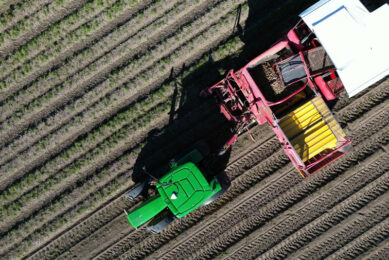A Smart Fruit that tells you how it is treated

The SmAvo uses a smart sensor platform to quantify the damage of avocadoes from the orchard to the packhouse.
Harsh treatment of produce during harvest and postharvest handling causes damage which increases unnecessary food waste. Identifying and illuminating problem handling practices could significantly reduce some of this food waste.
Detect critical impact points
In the past four decades, various artificial or electronic fruits equipped with electronic sensors have been developed to measure impacts during harvest and postharvest processing lines such as transport, grading and packaging of perishables. The goal is to detect critical impact points on the product, as well as to optimise processing lines, to reduce product damage.
Text continues underneath image
SmAvo
In South Africa, André Broekman created the SmAvo to do just that. He created the SmAvo with South African avocado producer ZZ2, and Prof Wynand Steyn from UP assisted André in his project.
It is not novel since it is similar to the Tuberlog Electronic Potato from Martin Lishman and other electronic fruits which are available commercially in Europe. Still, it is a first for the South African fruit industry.
André Broekman is doing his PhD in Transportation Engineering, combining railway engineering with artificial intelligence technology, in partnership with 4Tel Australia.
3D-printed avocado with sensor
The SmAvo is a PETG plastic, 3D-printed avocado which uses a smart sensor platform to quantify the damage of avocadoes from the orchard to the packhouse. This smart avocado’s purpose is data-driven guidelines for improving the postharvest processing and packing, improving the yield and overall quality.
The sensors in the SmAvo allows for a full suite of environmental measurements including acceleration and rotational velocity (3D), pitch, roll and heading, temperature and relative humidity, barometric pressure, light intensity, GPS-geolocation, speed and heading.
Text continues underneath image
Data collected from harvesting right through the packhouse
André includes three of these SmAvo’s in three picking bags of pickers, and then the data is collected from harvesting right through the packhouse. In the packhouse movement such as bin rotation and tipping of fruit into water baths impacts on the fruit quality.
The data collected from the sensors in the SmAvo can now inform decisions about changes needed to ensure a better-quality fruit to the consumer.
Text continues underneath images
Future application for the SmAvo
The SmAvo is the first successful demonstration of this type of technology where new smaller and affordable technology can be utilised to solve problems in a South African context. This project form part of the broader Future Africa @ UP initiative at the University of Pretoria.
The SmAvo technology utilised open source software and the project will be described in a publication that would be publicly available for use under a Creative Commons license.
Smart tomato
Andre and his team are already also busy with the SmaTo, a smart tomato, which will give the same information for the handling of tomatoes at ZZ2.
Join 17,000+ subscribers
Subscribe to our newsletter to stay updated about all the need-to-know content in the agricultural sector, two times a week.



